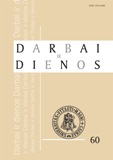The Unity of National History in Contemporary Lithuanian Historiography. A Study on Cognitive Processes
The Unity of National History in Contemporary Lithuanian Historiography. A Study on Cognitive Processes
Author(s): Moreno BondaSubject(s): Cultural Essay, Political Essay, Societal Essay
Published by: Vytauto Didžiojo Universitetas
Keywords: Lithuanian historiography; Cognitive processes; Memory; Historical time; Cognitive; Rhetoric; Hermeneutic; National history; Lietuvos istoriografija; Kognityviniai procesai; Atmintis; Istorinis laikas; Retorinės figūros; Hermeneutika
Summary/Abstract: This article investigates the relation between language and cognitive processes in the contemporary Lithuanian historiography. An attempt is made to distinguish the prejudices (using Gadamer’s terminology) or framing structures (Heidegger’s fore-structures) influencing the cognitive processes involved in the translation of noetic acts and memories into communicative acts. Basing on Bergson’s representation of the relation between conscience, memory and action (in this case intended as history-writing) we investigate how the unity in the national history (the continuity in the history of contemporary political entity) is construed. In the second part of the article, a number of historiographical works are analysed in order to put to test and revise the theoretical premises. Notably, while supposedly time and space are two of the most important framing structures, in Lithuanian historiography dealing with national history space is rather a concept selected and defined by that of time – not a fore-structure. In turn, historical time seems not to be a metaphor of the experienced one – it usually refers to already linguistically formulated concepts. This is evident when scholars renounce every ‘signifier’ directly connected to a ‘signified’ (terms directly referring to language, borders, geographical elements, administrative divisions) preferring already linguistically construed ‘meanings’ (nation, identity, culture) when formulating historical problems. The possibility to frame space in time and time in language permits to construe the unity of national history. The unity in the national history is attained by exploiting the polysemy of certain expressions and figures of speech. Moreover, in order to construe the unity in the national history, scholars tend to exclude the referents even from the definitions of framing structures such as space and time. We conclude that language is informing and shaping historians’ perception much more than time and space. Therefore, language should be considered the main and most evident prejudice operating and defining cognitive processes in historiography. Šiame straipsnyje autorius tyrinėja sąsajas tarp kalbos ir kognityvinių procesų šiuolaikinėje Lietuvos istoriografijoje. Straipsnyje bandoma išskirti prietarą (vok. Vorverständnis), remiantis Gadamerio terminologija, ar įrėminimo struktūras (Heideggerio įvardytos vok. Vor-structure), veikiančias kognityvinius procesus, kurie vyksta, kai noetinius aktus ir atsiminimus norima „išversti“ į komunikacinius veiksmus. Remdamiesi Bergsono nubraižyta schema, vaizduojančia ryšius tarp sąmonės, atminties ir veiksmo (šiuo konkrečiu atveju – istorijos rašymo), mes nagrinėjame, kaip konstruojama vienybė nacionalinėje istorijoje (kuri čia suprantama kaip tam tikras tęstinumas šiuolaikinio politinio įvaizdžio istorijoje). Antroje straipsnio dalyje pristatoma įvairių istoriografinių darbų analizė, suteikianti pagrindą pakoreguoti kai kurias teorines prielaidas.
Journal: Darbai ir dienos
- Issue Year: 2013
- Issue No: 60
- Page Range: 75-101
- Page Count: 27
- Language: English

